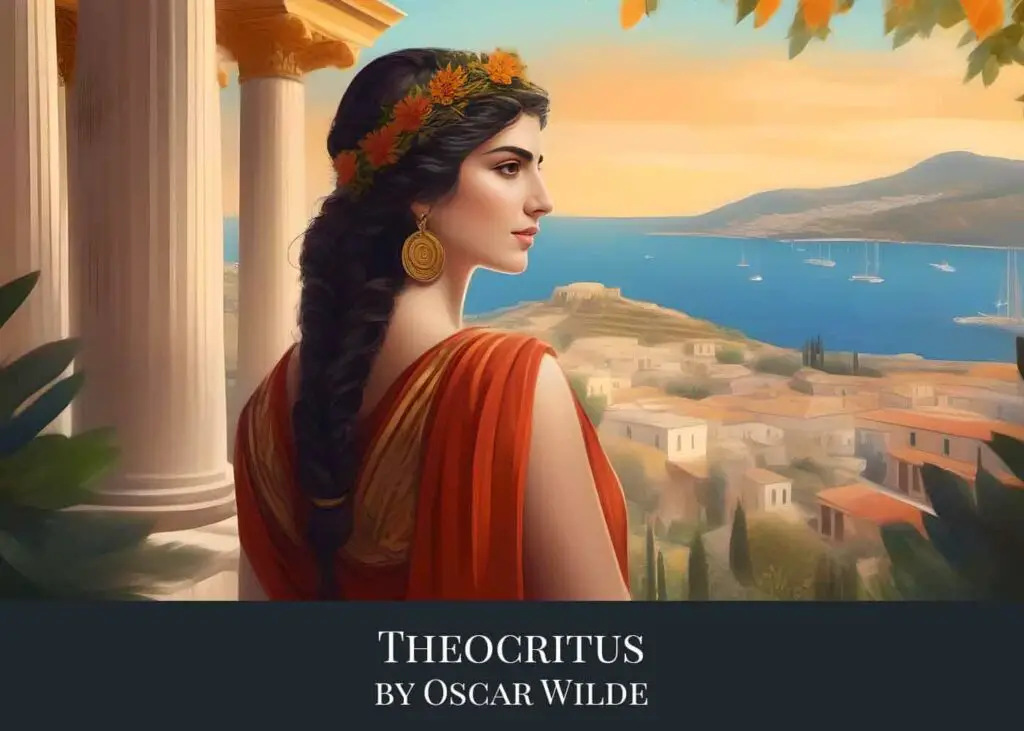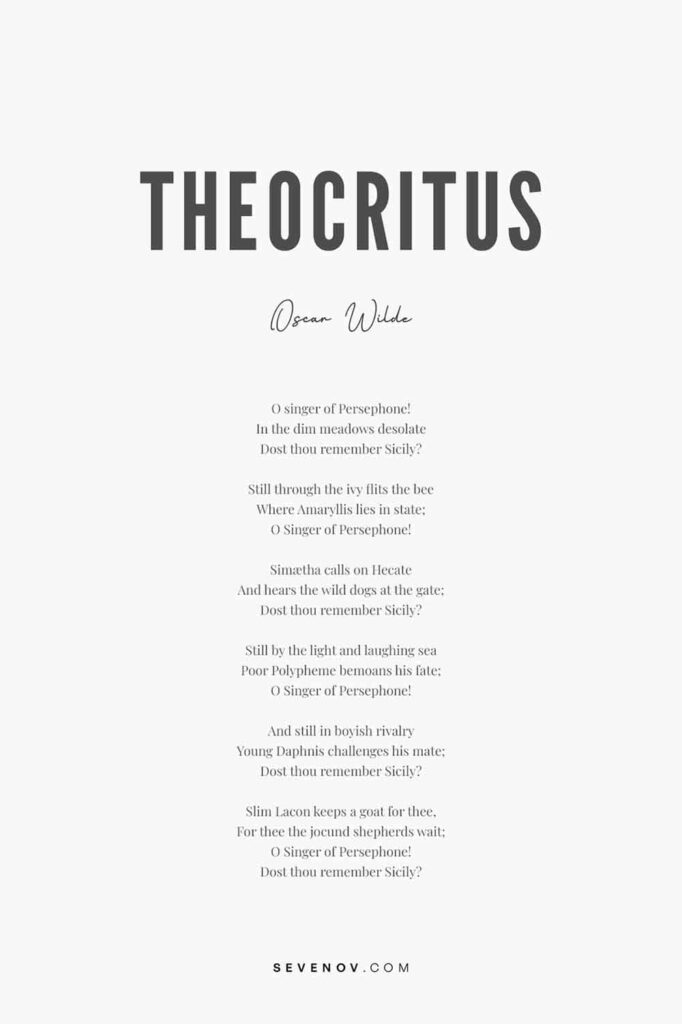
Theocritus by Oscar Wilde
Discover the pastoral beauty and mythological richness of “Theocritus,” a captivating poem by Oscar Wilde that is part of his poetry collection Poems. Wilde weaves together the tales of ancient Sicily with his unique lyrical prowess, inviting readers on a journey through classical landscapes. For those enchanted by Wilde’s poetic charm, Poems is available online at PageVio.
1. The Poem
O singer of Persephone!
In the dim meadows desolate
Dost thou remember Sicily?
Still through the ivy flits the bee
Where Amaryllis lies in state;
O Singer of Persephone!
Simætha calls on Hecate
And hears the wild dogs at the gate;
Dost thou remember Sicily?
Still by the light and laughing sea
Poor Polypheme bemoans his fate;
O Singer of Persephone!
And still in boyish rivalry
Young Daphnis challenges his mate;
Dost thou remember Sicily?
Slim Lacon keeps a goat for thee,
For thee the jocund shepherds wait;
O Singer of Persephone!
Dost thou remember Sicily?

Size: 8″ x 12″ (2:3 ratio)
Format: PDF
Copyright information: For personal use only
Note: Actual poster background color is white. For the sample poster, the background is made gray for illustration purpose.
2. Theocritus: A Villanelle Analysis
This poem, which appears to be written in the form of a villanelle, is rich with allusions to ancient Greek myths and locales, particularly those associated with Sicily. The repetitive nature of the villanelle with its refrain lines “O Singer of Persephone!” and “Dost thou remember Sicily?” underscores the theme of persistent memory and the haunting quality of the past.
Let’s go through the poem stanza by stanza:
O singer of Persephone!
In the dim meadows desolate
Dost thou remember Sicily?
The “singer of Persephone” could be an invocation to any poet or a muse-like figure who sings of Persephone, the goddess of spring and queen of the underworld. Persephone was famously abducted to the underworld by Hades and her story is strongly associated with Sicily in myth. The speaker asks if this singer remembers Sicily, which could imply a yearning for the lost beauty and vitality associated with Persephone’s time on Earth, which is contrasted with the “dim meadows desolate,” perhaps a reference to the lifeless state of nature during her absence.
Still through the ivy flits the bee
Where Amaryllis lies in state;
O Singer of Persephone!
Amaryllis is a pastoral figure from classical literature, often representing beauty and the love of the shepherd. To “lie in state” typically means to be on public display before a funeral, suggesting that Amaryllis is dead or somehow transcended. Despite this, nature continues its course – bees still flit through the ivy. This could symbolize the enduring cycle of life and nature, even in the face of loss.
Simætha calls on Hecate
And hears the wild dogs at the gate;
Dost thou remember Sicily?
Simaetha is a character from Theocritus’ Idylls, who, in despair over a lost lover, calls upon Hecate, the goddess of witchcraft. The reference to “wild dogs at the gate” could signify impending doom or danger. This echoes the theme of longing and the attempt to use supernatural means to reclaim what is lost, asking again if the singer recalls the land where these myths and emotions are alive.
Still by the light and laughing sea
Poor Polypheme bemoans his fate;
O Singer of Persephone!
Polyphemus is the Cyclops from the Odyssey who fell in love with the nymph Galatea and was spurned. He is often depicted as sitting by the sea, pining for her. This scene once again places us in a landscape filled with mythological history and heartache.
And still in boyish rivalry
Young Daphnis challenges his mate;
Dost thou remember Sicily?
Daphnis is a shepherd from Greek mythology often associated with pastoral poetry and the idyllic Sicilian landscape. He is presented in a moment of youthful competition, perhaps for love or sport. This creates a contrast with the other, more somber references, suggesting that the memories of Sicily include both joy and sorrow.
Slim Lacon keeps a goat for thee,
For thee the jocund shepherds wait;
O Singer of Persephone!
Dost thou remember Sicily?
Lacon may be another pastoral figure, part of this bucolic landscape, keeping a goat ready for the singer, indicating readiness for sacrifice or hospitality. The “jocund shepherds” evoke an image of a lively, pastoral scene awaiting the return or presence of the singer, with the poem closing with the refrain once more.
Overall, the poem speaks to the power of myth and memory, and how they persist through time. The refrains are melancholic and wistful, suggesting a deep longing for the lost world of Sicily as it exists in myth, literature, and perhaps personal memory. It evokes the rich tapestry of life’s experiences, intertwining joy, sorrow, beauty, and loss, all under the watchful gaze of the “Singer of Persephone,” who could be a metaphor for the enduring power of storytelling itself.
3. Conclusion
If you appreciate “Theocritus,” you might want to explore more of Oscar Wilde’s poetry.




